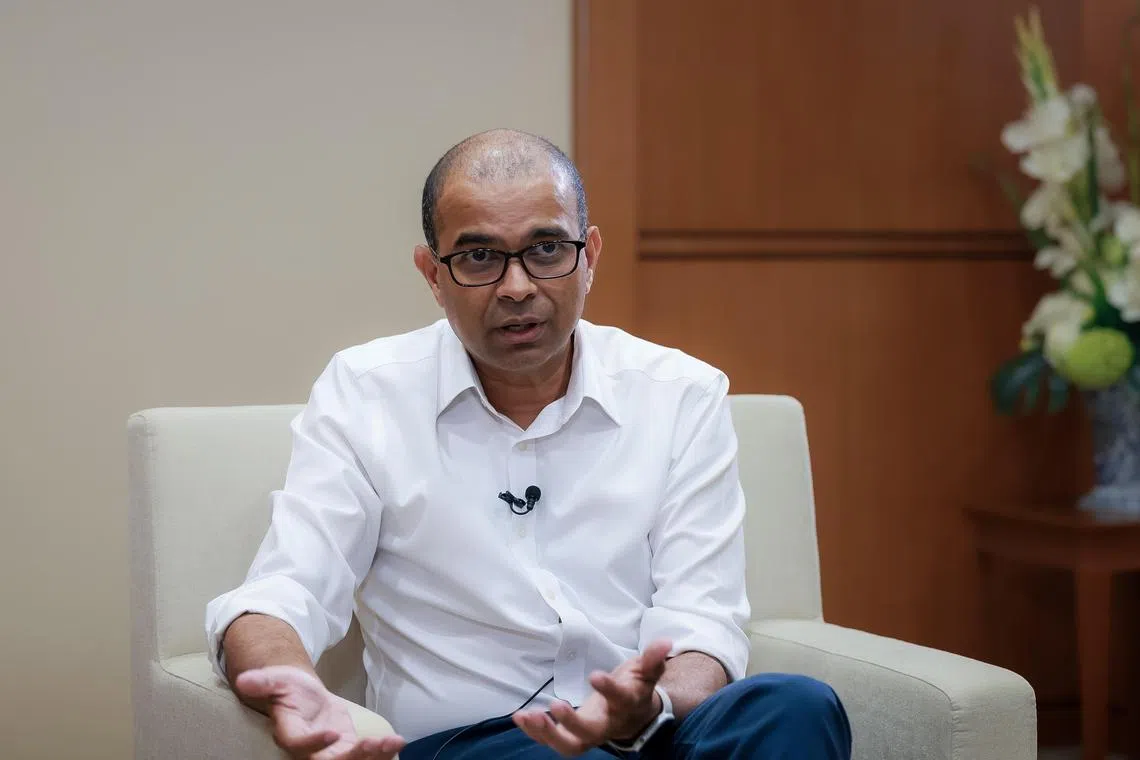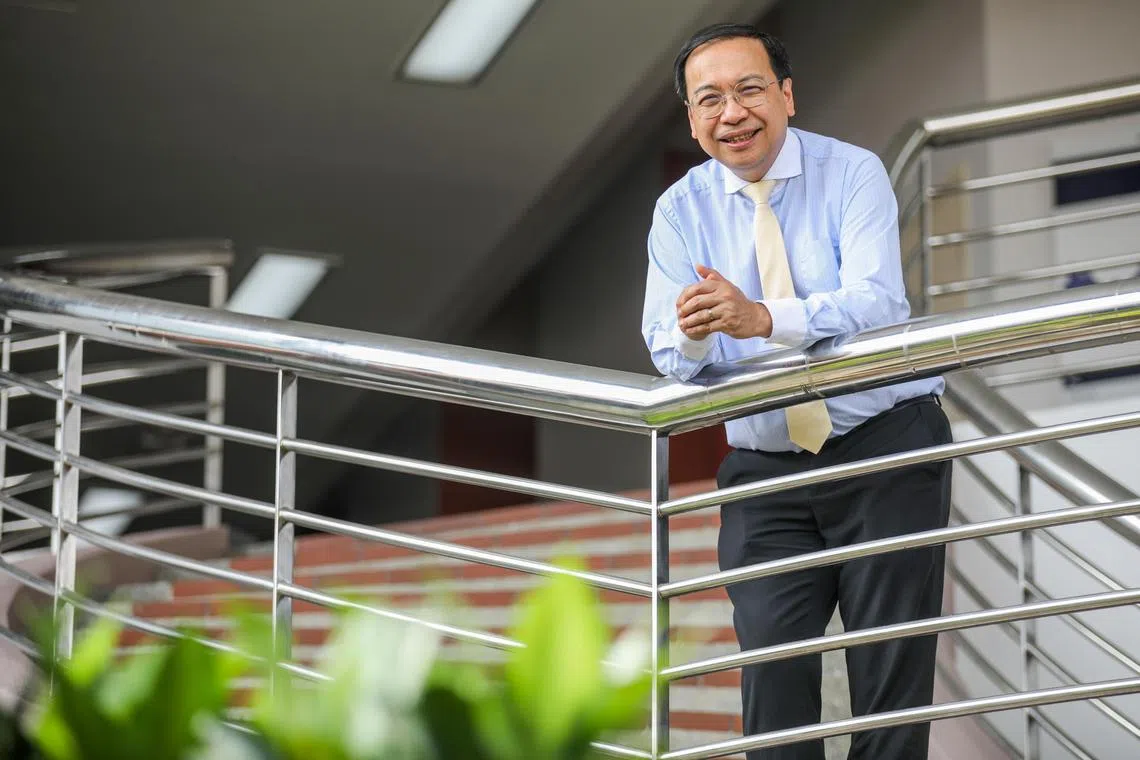No health without mental health
How Singapore is transforming the mental health landscape to stem a crisis
Sign up now: Get ST's newsletters delivered to your inbox

Dr Janil Puthucheary speaking to The Straits Times on Singapore's mental health landscape for the ST mental health series at the Ministry of Health on Sept 23.
ST PHOTO: GAVIN FOO
SINGAPORE – Waiting times for public-sector mental health services may currently be long, but there is light at the end of the tunnel as efforts to increase and improve mental health support in the community gather momentum.
“If you have access to care in the community, if you have access to a number of providers who are providing care… then your ability to get care sooner will be increased and improved,” Senior Minister of State for Health Janil Puthucheary told The Straits Times recently.
A new tiered model of care firmly anchors care in the community, where all involved – whether a nurse, family doctor, social worker, community worker or volunteer – will be on the same page in providing an individual the right level of support.
Though there are now more than 200 mental health touchpoints such as hotlines, text or e-mail platforms, digital resources, and in-person services in Singapore, people may not know about them or how to go about getting help.
The goal is to create an ecosystem that can link individuals to the care they need.
“The need to get to mental health care shouldn’t be about going to IMH (Institute of Mental Health) in the first instance. It should be about accessing through one of these first-stop touchpoints, and (it) can be a hotline, can be a textline, can be an online portal, and it can be a physical centre,” Dr Janil said.
He was speaking to ST in an exclusive interview on the evolving mental health landscape, nearly a year after he launched Singapore’s National Mental Health and Well-being Strategy in October 2023.
With mental health declining here and globally, the Government has made mental health and well-being a key priority in the national agenda.
Long wait times, poor understanding of mental health issues, and the fear of losing their employment are reasons why people shy away from seeking mental health care, and these are obstacles it hopes to overcome.
The Ministry of Health (MOH) said the average median wait time for a new subsidised psychiatrist appointment in a public hospital has risen to 47 days in 2023, up from 27 days in 2018, while the wait for a new psychologist appointment was at 36 days in 2023, compared with 28 in 2018.
IMH is nearly full, with its occupancy climbing from around 90 per cent before the Covid-19 pandemic to 97 per cent in the year ended March 2024.
To make it easier for people to seek help, a national mental health helpline and textline service will be operational by mid-2025. Dr Janil said this is not a service offering just the first level of support and counselling, but will also connect callers to more substantive treatment if they need it.
By 2030, all family doctors under Singapore’s Healthier SG preventive care programme and all 32 polyclinics will provide mental health services.
In addition, there will be 50 Community Intervention Teams (Comit) and 90 Community Outreach Teams (Crest) operating in social service agencies that can also provide counselling and educational support.
“Having access close to you in the community means that you have care available sooner where you need it, rather than having everything centralised and having a single waiting line, as it were,” Dr Janil said.
“So, that basically will mean that the capacity for mental health care within the community, within primary care, will increase. The availability of mental health care will increase, and then, the access that people who need mental health care will have to services earlier will also improve.”
In time, the Government hopes to reduce the stigma of mental health challenges and encourage various efforts at peer support and community initiatives, he said.
How the landscape is evolving
Singapore has 298 registered psychiatrists today, as well as several hundred psychologists – a profession where there is a lack of a regulatory framework.
According to MOH, the ratio of psychiatrists and psychologists to the population is 4.6 and 9.7 per 100,000 respectively, lower than in other Organisation for Economic Cooperation and Development nations.
Earlier in 2024, the Government said it will increase the number of public-sector psychiatrists and psychologists by about 30 per cent and 40 per cent respectively, by 2030.
MOH is also raising the number of beds for acute psychiatric care and step-down care to 1,070 and 3,500, from around 1,000 and 3,000 respectively, and increasing psychiatric nursing home beds.
The tiered care model will change the landscape for mental health care, said Adjunct Associate Professor Daniel Fung, the chief executive officer of IMH.
Spreading the burden of care will allow the 96-year-old institution to function as a national centre for psychiatric care, focused on treating the most severely ill patients, collaborate with care providers and provide expertise and support for the other tiers.

Adjunct Associate Professor Daniel Fung, the chief executive officer of IMH, says the tiered care model will change the landscape for mental health care.
ST PHOTO: LUTHER LAU
In the past, it also had to fulfil many of the functions that are increasingly provided by family doctors and community partners, he said.
Prof Fung said: “This strategy brings in the ecosystem beyond IMH, and gives the playing field out to the rest… Now, we have partners, and it’s very helpful, because we can’t do everything.”
Everyone has a part to play, and not all change efforts need to come from the Government.
A more comprehensive strategy, with specific recommendations that would require the participation of a wider community, beyond just the mental health and governmental spheres, is needed for a deeply complex issue, said former nominated MP Anthea Ong, who led an effort to create a White Paper for a national suicide prevention strategy.

The health of the young is the health of the future
All these efforts are happening as the spotlight is increasingly shone on mental health around the world, with the Covid-19 pandemic bringing it to the fore.
In particular, young people, transitioning from childhood to mature adulthood, who are bombarded by social media, struggle more with poor mental health.
In many countries, youth mental health has been declining over the past two decades, signalling a warning that major, long-lasting societal changes such as environmental, social, economic, political or technological changes, and changes in many societies, are increasing mental ill health, according to a Lancet study released in September.
As the onset of mental illness peaks at age 15, with 63 per cent to 75 per cent of onsets occurring by age 25, any substantial improvements in mental health must come via effects on young people, it said.
Efforts to prevent, detect and treat conditions early will not just improve lives, but also reap outsized benefits in terms of productivity and economic gains.
Recognising the importance of safeguarding mental health in young people, the Agency for Integrated Care (AIC) started Crest and Comit teams for young people aged 12 to 25 in 2020.
The teams are funded by the Government and offer services at no charge. They are run by social service agencies such as Limitless, Singapore Anglican Community Services, and Touch Community Services.
“The whole idea of Crest and Comit is to provide for facilities and interventions closer to home,” said AIC CEO Dinesh Vasu Dash.
Having 140 such teams by 2030 is significant as it will be more than half the number of active ageing centres for seniors, which will reach 220 by 2025, he said.
Mr Dinesh said they are not just expanding existing capabilities but also embedding mental health services within the community, so that people will know that it is normal to have struggles and will know where to get help.
Social service agencies also have their own mental health programmes and some may start to offer new services, such as play therapy to help abused children or pet therapy to help those with social anxiety, said Adjunct Associate Professor Lee Cheng, president of the Singapore Association for Mental Health (SAMH).
SAMH is expanding its rehabilitation care programme for those in recovery, in anticipation of increased referrals from the hospitals as well as walk-ins, and planning a new programme to help young working adults transition from school to working life, he said.
Ms Ong said: “It will certainly get increasingly easier to navigate the system, especially if we can seamlessly integrate primary care with community care to address accessibility and affordability.”
But the quality of care is also important, because a poor first encounter of the care experience can be re-traumatising, she said.
Across the world, governments spent an average of just over 2 per cent of their health budgets on mental health, according to the World Health Organisation Mental Health Atlas in 2020.
In 2022, Singapore’s projected mental health spend increased to $434.6 million, which was 3 per cent of total healthcare expenditure (not including Covid-19 expenditures).
The spending for mental health has stayed consistent at 3 per cent of total healthcare expenditure since 2019, but should go up to reflect the increased prevalence of mental health conditions, evolved needs and also dedicated suicide prevention efforts, said Ms Ong.
Fight the stigma
Creating the ecosystem is one thing, encouraging people to make use of it and not be deterred by negative attitudes and beliefs, prejudice and discrimination is another.
For years, many have shied away from the country’s only psychiatric hospital in Buangkok. Its CEO has long looked to increase the footfall at IMH and has urged staff to encourage visitation, as he wants to have mental health literacy programmes for the public there.
Walking around some parts of the Buangkok compound – built in 1993 – with its open-air walkways almost feels like being in a peaceful but slightly faded resort.
It belies the fact that the hospital has been running at near full capacity in recent years, which has resulted in a few occasions where some patients have had to stay in a high-security block that houses the forensic ward, Prof Fung said.
The majority of IMH’s long-stayers, most of whom have schizophrenia, are shunned by their families and have nowhere to go. The hospital is trying to place more of its suitable long-staying patients in nursing homes that are willing to take them, he added.
“Although we are much more understanding of mental illness and the stigma is much less now, the willingness for people to accept a person with illness back home or back to society is still low.”
At the end of the day, greater investment must be made in mental health literacy to rid mental health stigma, which can prevent someone from seeking help, experts said.
Stigma, said Dr Janil, is what the national strategy will seek to change, so that mental health and mental health struggles are seen as a normal part of every person’s health.
“More than 80 per cent of the population will never develop a mental illness. That doesn’t mean they don’t have a role to play,” said Prof Fung. “They need to understand mental illness. They need to be destigmatised against it... because you don’t know whether you will develop it yourself”.
Helplines
Mental well-being
Institute of Mental Health’s Mental Health Helpline: 6389-2222 (24 hours)
Samaritans of Singapore: 1-767 (24 hours) / 9151-1767 (24-hour CareText via WhatsApp)
Singapore Association for Mental Health: 1800-283-7019
Silver Ribbon Singapore: 6386-1928
Tinkle Friend: 1800-274-4788
Chat, Centre of Excellence for Youth Mental Health: 6493-6500/1
Women’s Helpline (Aware): 1800-777-5555 (weekdays, 10am to 6pm)
Counselling
Touchline (Counselling): 1800-377-2252
Touch Care Line (for caregivers): 6804-6555
Care Corner Counselling Centre: 6353-1180
Counselling and Care Centre: 6536-6366
We Care Community Services: 3165-8017
Online resources
carey.carecorner.org.sg
(for those aged 13 to 25)limitless.sg/talk
(for those aged 12 to 25)



